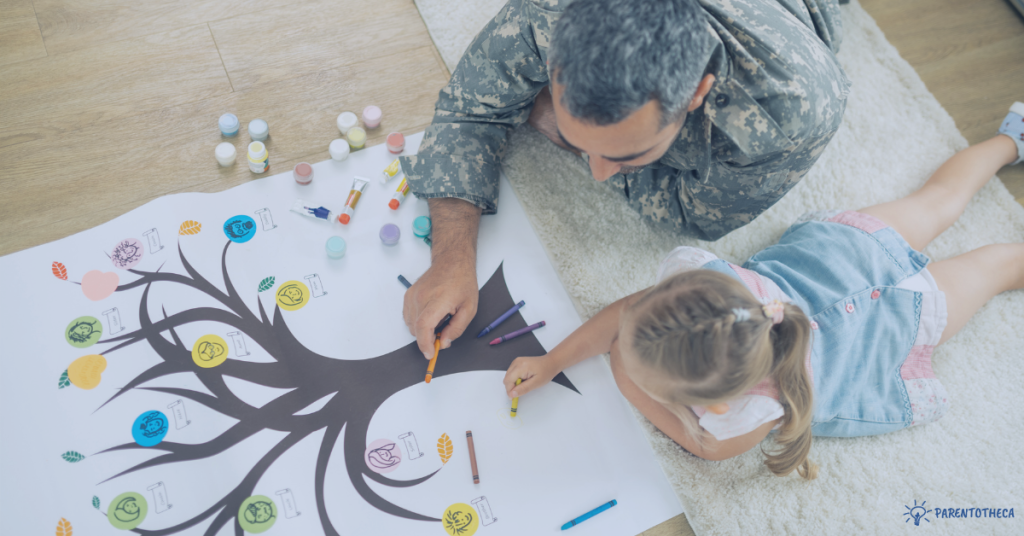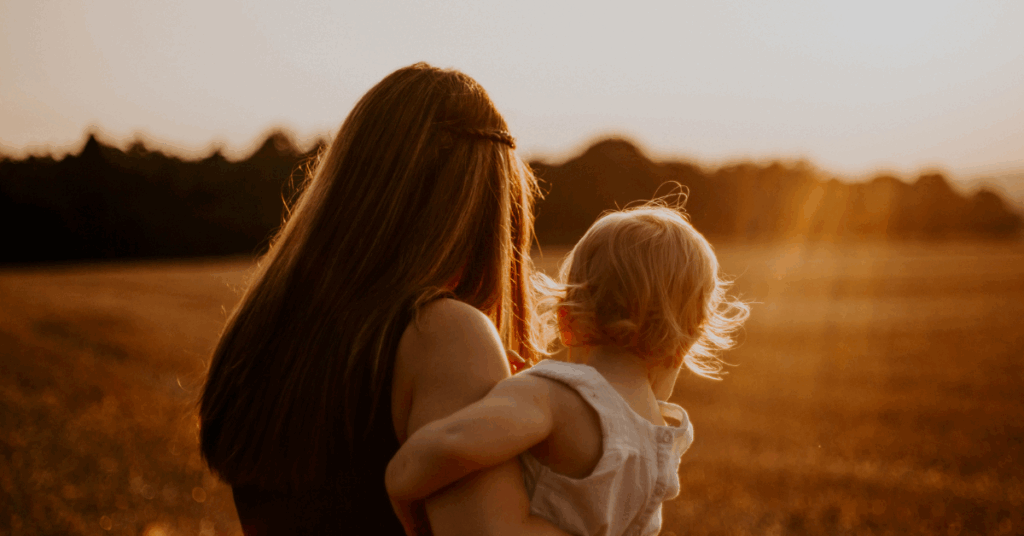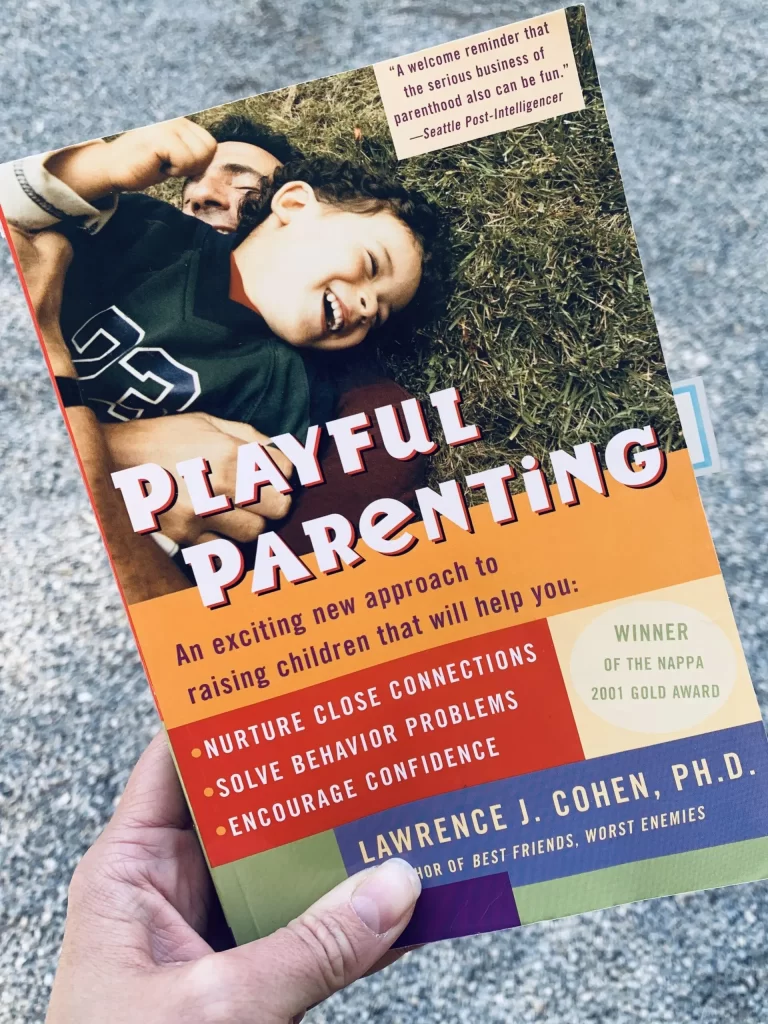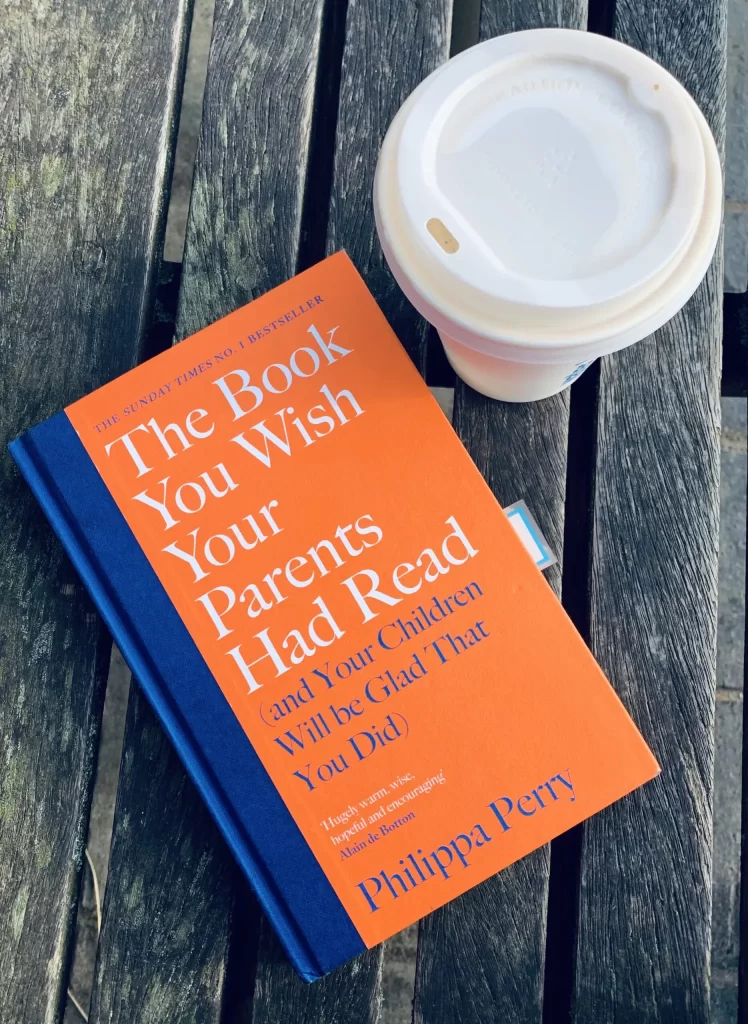Dawid’s grandma is the family’s matriarch and a great storyteller. Our boys call her “Duża Babcia”, which in Polish means “Big Granny”, and they absolutely love spending time with her whenever we go over to Poznan.
On our last visit, she picked an old picture from a family album and said, “Look, guys, that’s my family: these are my parents, these are my four brothers, and that’s me”. The boys’ eyes popped: “Whaaaat?! Can’t believe you were a little girl! Look at you!”. They bombarded Big Granny with questions and had a very lively discussion about her childhood. To make it even more fun, we went to a place where the picture was taken. Mind-blowing experience for the little kiddos.
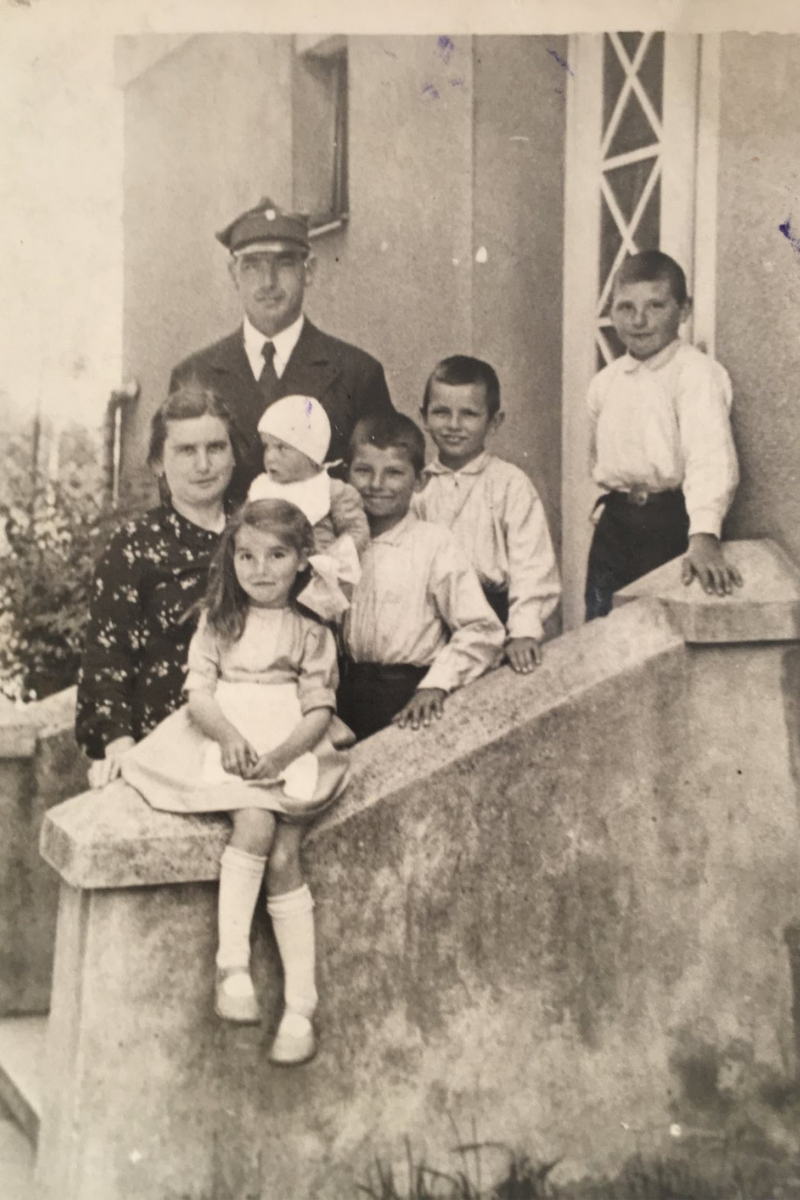
The moments like that are absolutely priceless – and not only because it’s lots of fun for children.
According to research, family stories are critical for our identity and emotional well-being. Children who know their family history are more resilient, have higher social competence, fewer behaviour problems, and higher self-esteem.
“Do you know?” – why does a strong family narrative matter?
Both of us are really into family history. For the last ten years, we’ve spent dozens of hours retelling our family stories to each other, dug up archives, had DNA tests and built our family tree on MyHeritage (it has more than 1500 people and keeps expanding). Now we enjoy retelling all these stories to our children.
We usually refer to it as a hobby, but after reading “The secrets of happy families” by Bruce Feiler (check out the notes), we found out that we are actually creating a strong “family narrative”, which is highly beneficial for our children’s emotional well-being.
Bruce picked-up this idea from Marshal Duke – Professor of Psychology at Emory University, whose research focuses on the importance of family stories and rituals in nurturing resilience in children.
A couple of decades ago, Marshal’s wife Sarah (who is also a psychologist) noticed one interesting thing: students, who knew a lot about their family, did better when they faced challenges. Marshall decided to test this observation.
Together with his colleague Robyn Fivush, they developed a “Do you know?” scale which consisted of 20 quite simple questions about family history. Then they asked a dozen families to complete the questionnaire and taped several dinner conversations. The researchers then compared the results to a battery of psychological tests and came to astonishing conclusions:
“The more children knew about their family’s history, the stronger their sense of control over their lives, the higher their self-esteem, and the more successfully they believed their families functioned. The “Do you know?” scale turned to be the best single predictor of children’s emotional health and happiness,”
– writes Feiler.
So here you go – if you want your children to be resilient, have high self-esteem, have fewer behaviour problems and enjoy emotional well-being then create a strong family narrative through storytelling.
Btw, check out Marshal Duke’s TED talk – he is really cool:
Family storytelling – which stories to tell
Telling family stories sounds quite simple. You can talk about how you met their daddy (mommy), where your grandparents lived, what they did for a living, your first school and so on. In the context of the family narrative, the stories and facts themselves are important, but the process you talk about in your stories is more valuable.
Your family stories could take three shapes:
- ascending (“Our family had nothing and we worked very hard to get where we are now”),
- descending (“We had it all and then we lost everything”),
- oscillatory (“We had ups and downs, but no matter what we always stayed together as a family”)
And guess which stories have the most significant impact? Oscillatory ones! We bet you have plenty of those. ☺
In their research paper, Duke and Fivush write:
“Families that share stories, stories about parents and grandparents, about triumphs and failures, provide powerful models for children. Children understand who they are in the world not only through their individual experience, but through the filters of family stories that provide a sense of identity through historical time.”
For children, it’s all about belonging to something bigger than themselves. That’s about developing a strong “intergenerational self”, as the researchers put it. And at the same time, family stories give children a powerful role model and inspiration – pretty much every family went through the dark times in the past, and they made it no matter what.
Moreover, such family stories help children uncover heroes who were actually a part of their families. Not some romantic heroes from the books or movies. But real people in their lives.
So if you feel inspired, we’ve pulled together a short guide on how to put theory into practice – here are eight family history activities, which can help you build your very own strong family narrative.
8 family history activities – how to pass your family history through generations
First of all, you may wonder: how a story about my first school could possibly win over a story about aliens or fairies?
Well, children just LOVE stories. Any stories. Especially when they hear them from their parents or grandparents. And experts say once you start telling them real family stories, they’ll beg for more.
We’ve tried it ourselves – it works as the researchers say! One small tip from us – start with funny stories first. Our boys started asking for a family story every night since I’ve told them how I ate a mango for the first time…with a peel ☺ which the 5- and 3-year-old found absolutely hilarious. So now, every night, when the lights go off, they say, “Can you please tell us another story from your childhood?”
So if you don’t have a pipeline of stories, start creating one. Here is how:
- Interview – encourage children to come up with some interesting questions that they can ask elders. And turn your next visit to grandparents (or call) into an interview. You can create a video or encourage children to write it down in a notebook.
- Create a family tree – if you don’t have a family tree yet, you can have fun creating one together with your children. It can take any shape (digital or a paper one), the main point is – tell your kids about their ancestors, show them how they are connected to the extended family and give them a perspective that they are a part of a big family.
- Go through pictures in a family album – this way, you can tell your children about many important places and events in your family. And kids LOVE looking at pictures and admiring how their family members looked like a long time ago. And yes, for smaller kids, it’s absolutely mind-blowing that their parents and grandparents were also small children once ☺ Moreover, it is an excellent way for kids to match all those stories which they hear from you with actual faces.
- Create stories together – every day of your life is a history – celebrate it together with your children. Create videos, snap pictures and ask them what they loved the most about a day, a trip, or an event. You can also play a game when someone starts a story, and then everyone takes turns to complete it.
- Bedtime stories – you can incorporate family stories into your bedtime routine. That’s what we use a lot in our family. When the lights go off, we usually tell our children one short story from the family life (sometimes we pick one, and sometimes we let boys decide on what they want to hear)
- Dinner stories – in “The Secrets of Happy Families”, Feiler suggests occasionally turning dinners into autobiography nights by having everyone tell a personal story. But it’s better to give everyone a heads up before dinner so that they can prepare for it. You can pick a particular theme so you can have, for example, “the best childhood memory” or “my biggest failure” evening.
- A virtual (or actual) tour around important family places – take your children on a big adventure to show them the most important places for your family. And of course, use this opportunity to teach them some family history. If you can’t take them there physically, try Google maps – virtual tours are also fun, and children absolutely love them!
- Tell relevant stories from your life – sometimes you don’t need to wait for a special occasion to tell a story. You can use micro-occasions to share your relevant experience with your children. For example, if your child is learning how to ride a bicycle, tell him a few stories from your childhood – who taught you, how you struggled, how you went on bicycle adventures with your parents.
Family stories are powerful. They make us feel that we are a part of something bigger than us. They make us strong and antifragile. And what’s more, you can pass this superpower through generations – by telling family stories to your children, you invest in the emotional well-being of your grandchildren. How awesome is that?!
Question for you – which inspiring story about your family you would tell to your child today?
Loads of love,
Irina and Dawid
Bonus: “Do you know?” scale
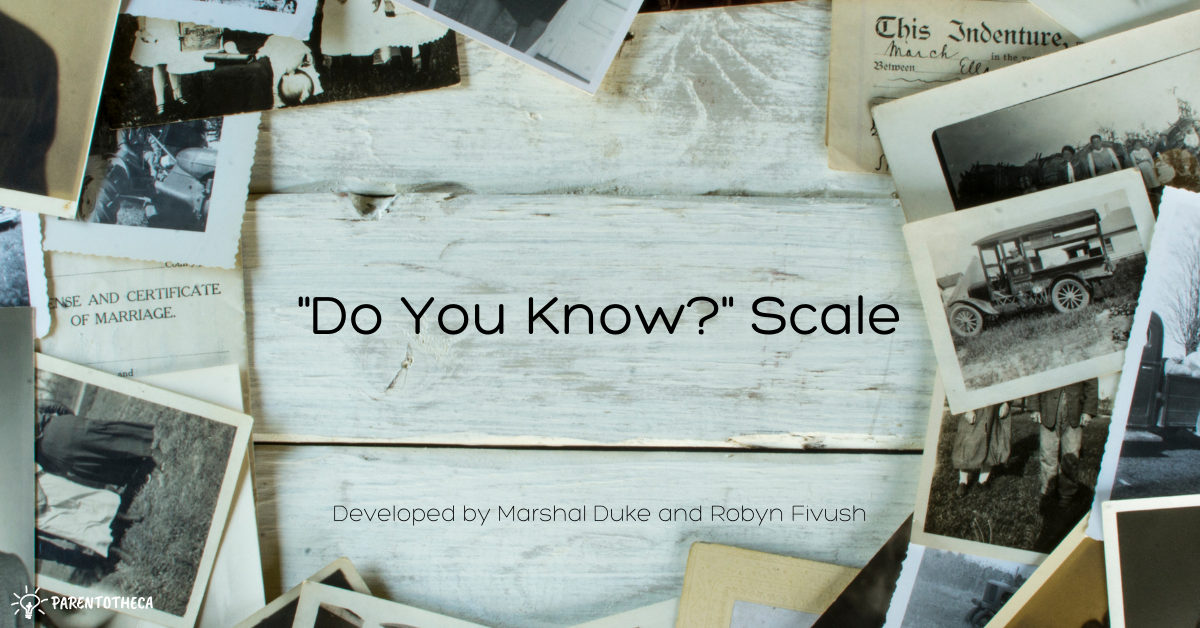
After reading the book, we got curious about which questions Dr Duke and Dr Fivush asked children during their research. Luckily, they shared the “Do You Know?” scale here.
So these 20 questions could be a great starting point for creating your very own tradition of telling family stories. But again, remember that the facts are not as important as the process of sharing family stories.
Here are the 20 questions:
- Do you know how your parents met?
- Do you know where your mother grew up?
- Do you know where your father grew up?
- Do you know where some of your grandparents grew up?
- Do you know where some of your grandparents met?
- Do you know where your parents were married?
- Do you know what went on when you were being born?
- Do you know the source of your name?
- Do you know some things about what happened when your brothers or sisters were being born?
- Do you know which person in your family you look most like?
- Do you know which person in the family you act most like?
- Do you know some of the illnesses and injuries that your parents experienced when they were younger?
- Do you know some of the lessons that your parents learned from good or bad experiences?
- Do you know some things that happened to your mom or dad when they were in school?
- Do you know the national background of your family (such as English, German, Russian, etc.)?
- Do you know some of the jobs that your parents had when they were young?
- Do you know some awards that your parents received when they were young?
- Do you know the names of the schools that your mom went to?
- Do you know the names of the schools that your dad went to?
- Do you know about a relative whose face “froze” in a grumpy position because he or she did not smile enough?
How many points did your children score? ☺
